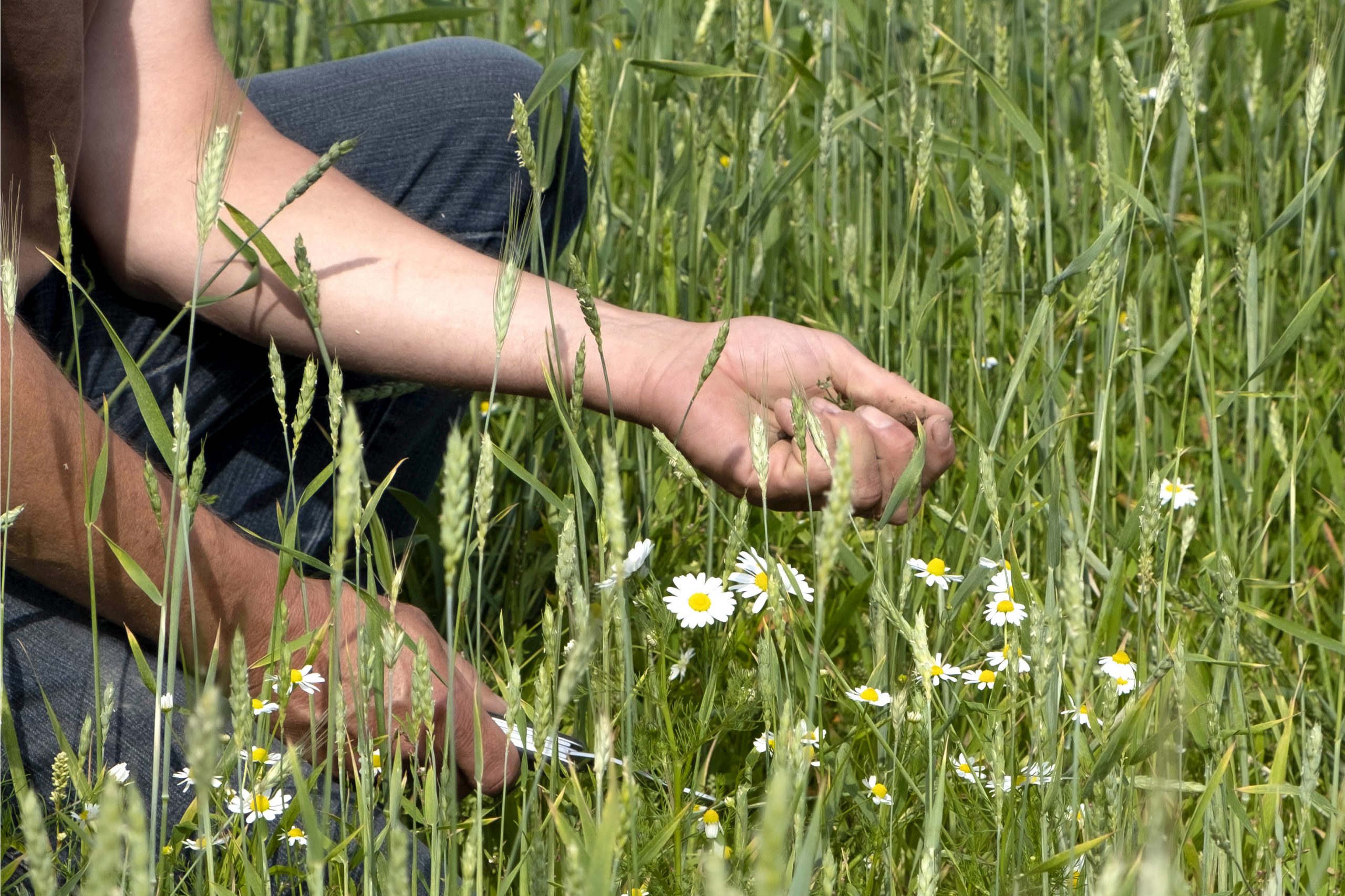 By Seeds4all
By Seeds4all
Seeds for hope were sown this summer at the Seeds4all seminar, when cereal farmers and breeders from several countries gathered on the island of Pellworm in July to discuss the future of local organic seed production. Off the German coast in the North Sea, Pellworm faces its own challenges as an island below sea level. In this weirdly rainy and burning summer, it was a fitting location for talk of sustainability and resilience. Report by Seeds4all.
Seeds4all organised this seminar on the future of local seed production together with members of the local association “Ökologisch Wirtschaften!“, that has made a huge contribution since the 1990s to moving the local economy towards greater sustainability and resilience.
Our main goal was to begin a discussion on the future possibilities for local agriculture to develop, specialise and adapt, through seed breeding and production, to the already changing climate and environmental conditions.
In fact, we met in a place that has always been subject to major threats linked to global warming and rising sea levels. The great flood of 1634 washed away two thirds of the lowlands on the west coast of Schleswig Holstein, and it is said by some people that Pellworm island might already be lost by the end of this century.
Given this harsh reality, one question arises: does it really make sense to invest in long-term organic seed breeding and development on the island of Pellworm?
Which brings us back to the palpable and more general tension we kept discussing during our few days on the island, namely the importance and intelligence of not giving up ambitions when the challenges appear impossible to be overcome.
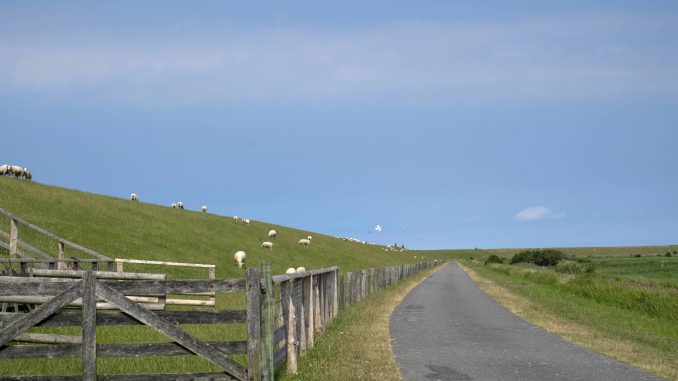
Local seed production as the key to a new transition
There is a rebellious young energy on Pellworm island that does not accept that climate challenges are undeniably lost. “Only dead fish swim downstream or go with the tide” goes a saying, and the islanders seem to take this seriously.
And indeed, we could precisely consider local seed production as the key to a new transition that could put an end to inefficient and even destructive agricultural practices, while guaranteeing a future for these young rebels and dreamers who are determined to remain on the land where they were born.
The other reason why we abet this meeting in 2021 was to share the stakes and benefits related to the new EU regulation on organic production, which stipulates that only seeds specifically suitable for organic production may be used in organic farming in the years following the entering into force of the regulation in January 2022.
Up to now, organic farmers were allowed to use seed material bred for conventional cultivation, which is usually high-yield varieties that rely on treatments with herbicides, pesticides, and the supply of artificial fertilisers.
With the so-called European “Green Deal”, the EU has set itself the goal of converting at least a quarter of European farming to organic production by 2030 with a view to climate protection. This should stimulate the development of a growing market for organic seeds, requiring the commitment and dedication of a broad range of organic breeders and farmers.
Right now there are hardly any seeds that have been selected for disease resistance and pests which would also contribute to improving soil life and fertility. Cultivated plants that adapt to climatic change and can compete with weeds during cultivation are equally important for organic farming practices.
In this context, choosing to specialise in the production of seeds adapted to local growing conditions and capable of filling a gap in the European organic seed market, could be even more beneficial to the sustainable development of the island’s farms and their economic growth.
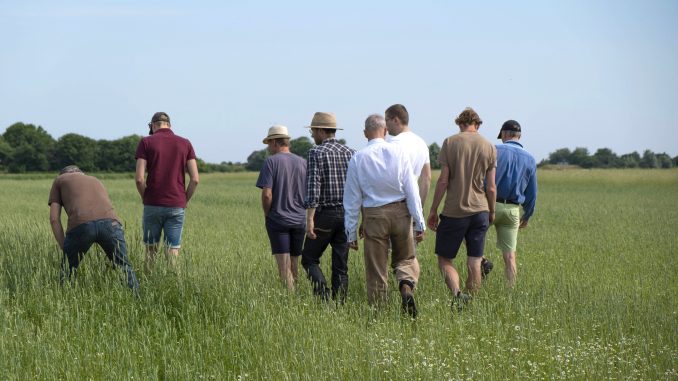
We could feel the need of the younger generation to check new ways of doing things and get new skills, in a rapidly changing economic and ecological environment
Breeding organic seeds as an intergenerational project
We initially came to Pellworm to meet a local cereal farmer, Jan Gonne Thams, 26, who has recently started producing his own organic seed. We invited several breeders from Portugal, Denmark, Belgium and Germany to attend the meeting for exchange of practices;
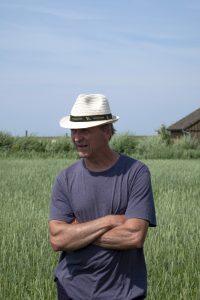 Anders Borgen, from Denmark, has been an organic farmer for 25 years and has worked as an organic cereal grower in North Jutland, Denmark, for 15 years. He has studied agricultural science and philosophy and is a specialist in the development of cereal populations. Anders has been particularly well known in Europe for his work on bunt disease. He owns Agrologica, an organic and experimental farm founded in 1984 and working with heritage grains since 2007. The project allows him to get support and to be able to finance his breeding activity thanks to membership fees or subsidies.
Anders Borgen, from Denmark, has been an organic farmer for 25 years and has worked as an organic cereal grower in North Jutland, Denmark, for 15 years. He has studied agricultural science and philosophy and is a specialist in the development of cereal populations. Anders has been particularly well known in Europe for his work on bunt disease. He owns Agrologica, an organic and experimental farm founded in 1984 and working with heritage grains since 2007. The project allows him to get support and to be able to finance his breeding activity thanks to membership fees or subsidies.
Read Seed4all’s interview with Anders.
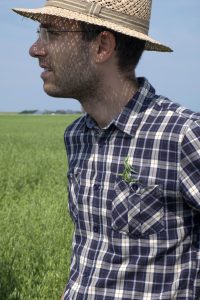 Carl Vollenweider is an organic and biodynamic breeder and co-team leader at “Forschung & Züchtung Dottenfelderhof“, a biodynamic farm located in Hessen (DE). This leading organic plant breeding initiative is engaged in resistance and quality breeding of wheat, barley, maize, oats, rye and some vegetables. Breeding research activities focus primarily on seed-borne diseases and heterogeneous cereal populations, to develop varieties suitable for organic growing conditions – competitive against weeds, resistant to disease, of a high nutritional quality and adding to a rich genetic diversity, etc.
Carl Vollenweider is an organic and biodynamic breeder and co-team leader at “Forschung & Züchtung Dottenfelderhof“, a biodynamic farm located in Hessen (DE). This leading organic plant breeding initiative is engaged in resistance and quality breeding of wheat, barley, maize, oats, rye and some vegetables. Breeding research activities focus primarily on seed-borne diseases and heterogeneous cereal populations, to develop varieties suitable for organic growing conditions – competitive against weeds, resistant to disease, of a high nutritional quality and adding to a rich genetic diversity, etc.
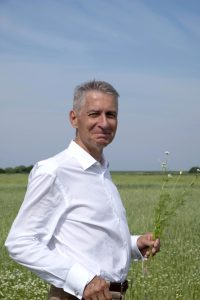 Stefan Doeblin is the founder of two seed production companies located in Portugal and Spain, and of the NGO Lebende Samen. He is also working on the development of leguminous crops, which fix nitrogen from the atmosphere in the soil and thus improve soil fertility for crops. Working closely with organic farmers, he is particularly aware of the issue related to the lack of choice and diversity within the organic seed market and tries to sensitize on the importance to enlarge and diversify it early enough, in order to ensure that truly sustainable stakeholders take control of it before it would be dominated by the conventional seed companies. Read Seed4all’s interview with Stefan.
Stefan Doeblin is the founder of two seed production companies located in Portugal and Spain, and of the NGO Lebende Samen. He is also working on the development of leguminous crops, which fix nitrogen from the atmosphere in the soil and thus improve soil fertility for crops. Working closely with organic farmers, he is particularly aware of the issue related to the lack of choice and diversity within the organic seed market and tries to sensitize on the importance to enlarge and diversify it early enough, in order to ensure that truly sustainable stakeholders take control of it before it would be dominated by the conventional seed companies. Read Seed4all’s interview with Stefan.
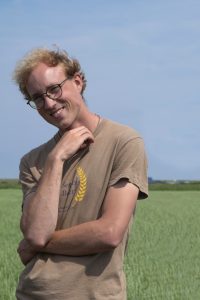 Lucas van den Abeele is an employee of the 3 Fonteinen brewery located in the Pajottenland region of Belgium, brewing special Lambic and Gueuze beers from traditional wheat and barley varieties. Lucas has initiated the creation of a network gathering local cereal producers who got involved in growing the traditional varieties used by the brewery. During our seminar, his experience was useful to support the implementation of a participative breeding process in Pellworm, which could involve, in addition to the farmers producing the organic seed, a stakeholder guaranteeing a stable demand for specific cereal varieties, like a bakery. Read Seed4all’s interview with Lucas.
Lucas van den Abeele is an employee of the 3 Fonteinen brewery located in the Pajottenland region of Belgium, brewing special Lambic and Gueuze beers from traditional wheat and barley varieties. Lucas has initiated the creation of a network gathering local cereal producers who got involved in growing the traditional varieties used by the brewery. During our seminar, his experience was useful to support the implementation of a participative breeding process in Pellworm, which could involve, in addition to the farmers producing the organic seed, a stakeholder guaranteeing a stable demand for specific cereal varieties, like a bakery. Read Seed4all’s interview with Lucas.
 Jan Gonne Thams is a freshly graduated farmer from Pellworm, who will take over his family’s organic farm in autumn this year. The farm is in a process of diversification with a balanced animal/crop production, a shop where local and regional products are sold, and on-farm tourism activities. He started his first trial with an evolutionary rye population from Sweden in 2020. This year he has sown this rye again and grown another population of wheat from Anders Borgen and two organic wheat lines from Dottenfelderhof on a trial basis.
Jan Gonne Thams is a freshly graduated farmer from Pellworm, who will take over his family’s organic farm in autumn this year. The farm is in a process of diversification with a balanced animal/crop production, a shop where local and regional products are sold, and on-farm tourism activities. He started his first trial with an evolutionary rye population from Sweden in 2020. This year he has sown this rye again and grown another population of wheat from Anders Borgen and two organic wheat lines from Dottenfelderhof on a trial basis.
Read Seed4all’s interview with Jan Gonne.
Our seminar programme included visits to Jan Gonne’s fields to observe and discuss the results of his first growing trials, and we were very pleased to welcome other farmers from the island who were keen to listen and share everyone’s experiences.
It was nice to see that the islanders mainly came as a parent-child “couple”, as if the opportunity to start working with organic seed required intergenerational agreement. We could feel the need of the younger generation to check new ways of doing things and get new skills, in a rapidly changing economic and ecological environment.
Their visions included seed autonomy; tapping into the added-value-chain with seed being fit for the rapidly changing future of conditions for production; multiple use of the crops, including healthy animal feed and straw; baking high quality bread and making consumers aware of the interrelations between the breeding, the cultivation and the quality of the farm products. Our conversations continued into the late night of the main seminar day. All agreed that getting involved with organic breeding and seed production needs a spirit of cooperation and experimenting, as the best solutions appear from trials, errors and common evaluation.
On Pellworm, the opportunity to drive that kind of participative breeding could be the path to a crucial transition able to tackle the growing difficulties in growing crops. As it was said several times during the seminar, “when you can’t go on doing things as before, you just have to stop”; and indeed today’s agriculture must be particularly aware of and flexible in the face of continuous changes in climate, territories or resources, in order to find solutions.
A particularly striking example of this, seen in Pellworm, is related to an odd consequence of the climatic and agricultural changes that have occurred in Europe in recent years.
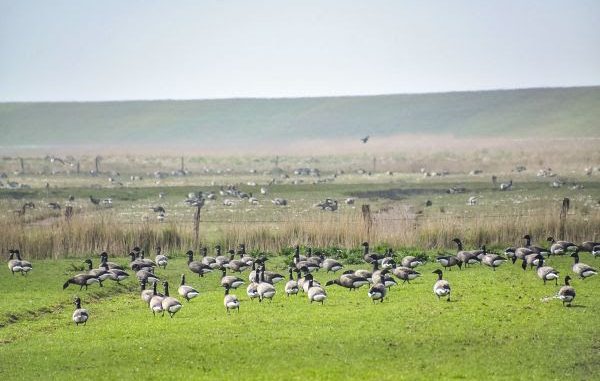
The geese issue: a radical example of the urgency to adapt to external disturbances
Since the 1970s, the European Union has banned the hunting of several endangered wild geese species. One of these is the white-fronted goose, also known as the barnacle goose. The population has since largely increased from 50.000 individuals in 1970 to around 1.3 million today.
The barnacle goose is a breeding bird native to the high Arctic. It breeds in Siberia in autumn and migrates to the northern coasts of Germany and the Netherlands in early winter when the temperatures in eastern Siberia become extreme. In recent years, however, due to increasingly mild winters, the geese have shortened their migration route, remaining mainly in northern Europe.
The goose’s diet leads it to colonise grazed salt marshes (outside and on dykes) and arable land. The intensification of agriculture with high-energy cereal varieties growing during winter along the North Sea coast has encouraged geese populations to stay on the Friesland islands, including Pellworm. They can accumulate enough fat to return to the Arctic without having to make any stopovers. At the same time, as their numbers increase, so does the amount of feed they need, which makes them stay longer.
All these factors – global warming, intensification and homogenisation of farming practices, changes in the feeding habits and migration of the geese – are responsible for one of the most critical problems in Pellworm at the moment: the settlement of thousands of geese on the island every year, from October to April, which devastate the winter cereal crops, sown in September.
It causes anger, distress and anxiety to farmers. Many of them, at their wits’ end, are calling for the eradication of the geese, even though they are protected. Tensions between supporters of reducing the populations and nature conservationists are growing.
However, a hunting strategy appears to be an unviable solution. Firstly, because it would require massive and permanent interventions, which would have to be repeated every year. Secondly, because it would jeopardise the protection policies of other bird species that nest and breed in the same areas. Pellworm is on top of that a unique nature park and Biosphere reserve with which tourists are specifically attracted.
A viable solution, detailed in an excellent article published by the organisation NABU, would be to designate, within the territories impacted by the presence of geese, areas where they would be able to settle without being disturbed (“go-areas”), different from other areas, mainly cultivated (“no-go-areas”). Geese would probably adapt quickly, if they could find enough food, water and hiding places in the go-areas.
During the discussions between the invited breeders and local farmers, other considerations emerged. The first was that this was a good example of the need to develop more flexible farming practices, capable of adapting to this type of sudden and particularly disruptive exogenous event. We met with several farmers who were already adapting to the now inevitable presence of geese on the island, by abandoning winter crops in particular. It is fair to say, however, that many of these sympathetic farmers are in a favourable situation as agriculture no longer constitutes the major part of their income, because they have had the opportunity to diversify their activity into tourism or the production and sale of renewable energy.
Another way out of this problem, the one we like best, would be the development and cultivation of populations and new varieties of plants, particularly of cereals, adapted to these vernacular conditions: less energetic, with more resistant shoots, capable of growing and be harvested in a shorter period of cultivation, so that they can be sown in May and harvested in September, when the geese are further north…a new way of living with migrating migrants.
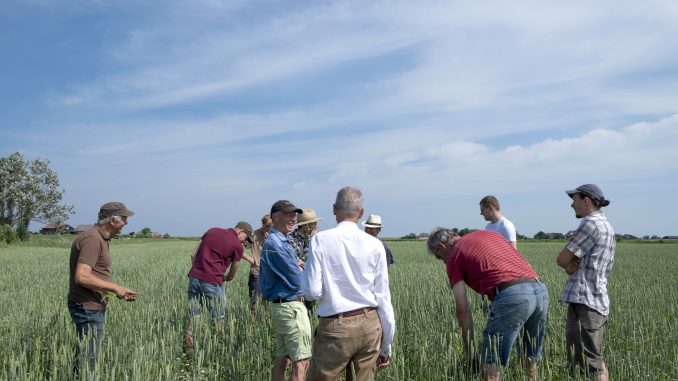
Taking the inactive German Government to the Constitutional Court
 What this and other global warming issues tell us is that we can no longer ignore the need to rethink agricultural practices in Pellworm, just as we can no longer turn a blind eye to the need to adapt our behaviors to the many global problems arising from the increasing scarcity of energy resources, the rise in greenhouse gas emissions, the melting of continental glaciers, the disappearance to come of coastal areas, the increase in natural disasters…
What this and other global warming issues tell us is that we can no longer ignore the need to rethink agricultural practices in Pellworm, just as we can no longer turn a blind eye to the need to adapt our behaviors to the many global problems arising from the increasing scarcity of energy resources, the rise in greenhouse gas emissions, the melting of continental glaciers, the disappearance to come of coastal areas, the increase in natural disasters…
We had the pleasure of meeting and discussing this with Sophie Backsen, a young native of the island who recently had the German State condemned for climate inaction. Despite the victory, she explained her frustration at the indifference and reluctance to elevate the debate on climate issues, and finally take real action to begin the urgent transitions we must tackle. As a young citizen and future local farmer, Sophie nonetheless feels the need to oppose the local and national lethargy. We were very impressed by her outspokenness and determination to fight against those who do not take the responsability of their choices, agricultural or otherwise. Like her Frisian ancestors, Sophie is a stubborn resistor.
And we could not but admire the commitment of this local young generation who has the strength to initiate a new transition, in the line of the one undertaken by the association “Ökologisch Wirtschaften!” with great success.
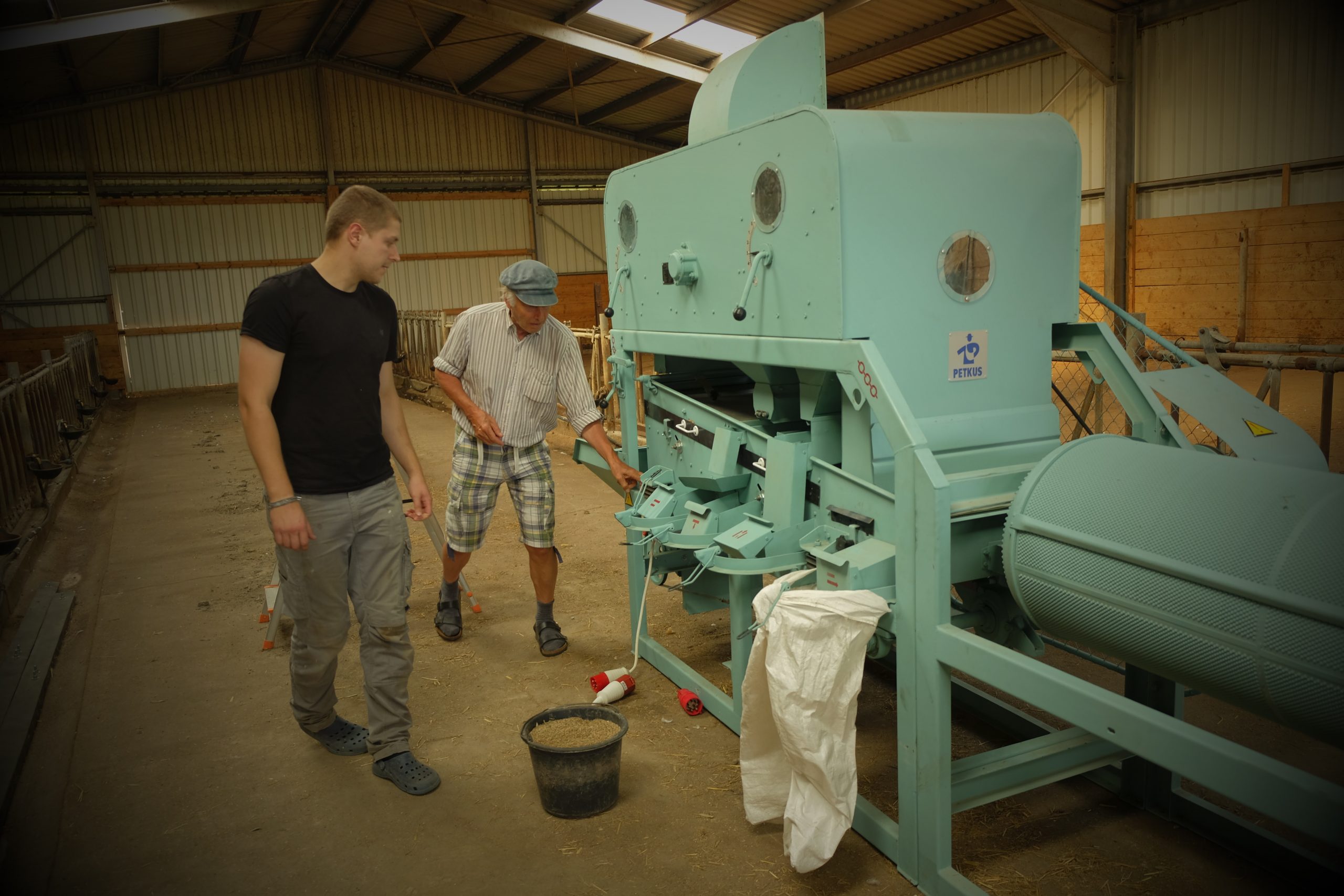
The experiment goes on
In the end, this gathering was a success.
We had a great time together on the farm of Hannes Lorenzen‘s family, with constant exchanges of practices, knowledge and know-how, aiming at inspiring the young farmers on the island to diversify their activities with organic seeds. Our guests gave them hope and willingness to cooperate in the coming months; and we were absolutely delighted to learn, after our stay, that two more farmers consider to join Jan Gonne in his experiment and try seed production.
The different organic varieties that Jan Gonne tested in his fields were harvested at the end of August. Everything was of good quality, quite clean but, as he expected, the yield was rather low. The geese damaged the fields where the Danish wheat populations were grown rather heavily. They also ate Jan Gonne’s barley and much of other barley fields on the island, both organic and conventional, but they didn’t touch his rye at all.
Jan Gonne then cleaned and sorted the seeds with a brand new Petkus machine from Austria, renovated in Ukraine. He’s now keeping the larger grains for next year’s crops and will start selling the smaller ones through the shop on the island and, hopefully, to the network of the so-called free bakers movement in Germany.
The “Freie Bäcker movement” works mainly with organic cereal populations and is expanding quickly with a specific bread quality in Germany.
Together with the new interested farmers, he would like to expand his trials next year, including dinkel and other populations, possibly northern varieties of populations that could be sown in May and harvested in late August, during the time when the geese are in holidays in Siberia…
The experiment goes on and we will follow it closely to tell you more in the following years!
The Seeds4All team would like to thank everyone who participated in the seminar, and hope to meet again soon, with more people from more places.
Learn more about Seeds4all and how to get involved.
Read more about sustainability and resilience on Pellworm island.
More on seeds
Catcher in the Rye: Breeding Diversity for Unpredictable Conditions
Climate Crisis | EU Agriculture Needs Systemic Solutions, Not New GM Technology
How Gardeners are Reclaiming Agriculture from Industry, One Seed at a Time
How Gardeners are Reclaiming Agriculture from Industry, One Seed at a Time
Species Extinction & the Case for a Global Moratorium on Gene Drives


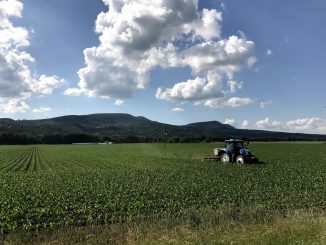

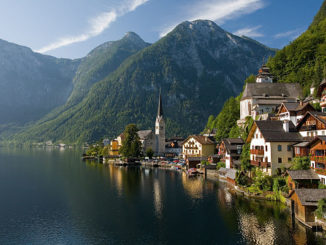
1 Trackback / Pingback
Comments are closed.